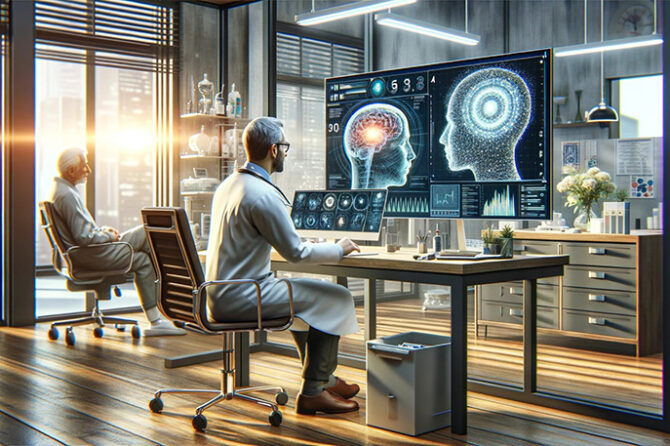
In his profound exploration, “The Real Era of the Art of Medicine Begins with Artificial Intelligence,” Bertalan Meskó encapsulates a transformative vision for healthcare. Meskó’s narrative traverses the historical evolution of medical practice, from the empiric wisdom of Hippocrates to the digitized precision of today’s artificial intelligence (AI) applications. This article, by articulating a future where AI not only augments but fundamentally enhances the art of medicine, underscores the pivotal moment we stand at in healthcare history.
Meskó begins by reflecting on the origins of medical practice, a time when the art of medicine was primarily guided by experience and observation. This era was defined by the personal touch of the caregiver, an element that has been under threat in the age of digitalization. Yet, rather than seeing technology as a detractor from this art, Meskó posits that AI could be the very thing that revitalizes it.
Central to Meskó’s argument is the distinction between the act of care and the logistics that surround it. The advent of AI in healthcare is often misconstrued as a harbinger of a cold, mechanized future where technology supersedes human touch. Meskó, however, dismantles this fear by illustrating how AI can relieve medical professionals of the burdensome administrative tasks that currently detract from their ability to provide care. By automating routine processes, AI frees up practitioners to focus on what truly matters: the patients.
The article delves into the transformation of the doctor-patient relationship in the digital age, where patients are more informed and involved in their care than ever before. This shift towards a more collaborative model of care is something that Meskó views as a step forward, not back. He convincingly argues that AI and digital health technologies, rather than undermining the physician’s role, actually empower doctors to fulfill their original mission of healing with compassion, creativity, and care.
Meskó draws parallels between the integration of AI in medicine and historical milestones in games like chess and Go, where AI’s victories over human champions led not to the decline of human engagement but to an enriched understanding and participation in these games. He suggests that, similarly, AI’s role in medicine will not replace human doctors but augment their abilities, enabling them to deliver care at an unprecedented level of precision and personalization.
Furthermore, Meskó envisions a future where AI’s capacity to analyze vast datasets and learn from patterns could lead to breakthroughs in treatment strategies that humans alone might never conceive. This potential to uncover new avenues for curing diseases speaks to the heart of the modern art of medicine, as defined by Meskó: a practice where the challenge is not just to care for patients but to understand and innovate on the methods of care.
Yet, Meskó does not shy away from the challenges that this vision of AI-enhanced healthcare presents. He acknowledges the need for vigilance in overseeing AI systems, ensuring they are guided by and aligned with the best clinical judgment. The final frontier, as Meskó sees it, is not merely to utilize AI in diagnosing and treating but to understand the “why” behind AI’s conclusions, thereby merging the art and science of medicine into a new paradigm.
As the article concludes, Meskó reiterates his belief in the enduring value of the human elements of healthcare—compassion, empathy, and creativity. He calls for a balanced approach to integrating AI into healthcare, one that preserves these qualities while harnessing AI’s potential to revolutionize care delivery.
In essence, Meskó’s article serves as a clarion call to embrace the era of AI in medicine, not with trepidation but with optimism. By highlighting the complementary strengths of human intuition and artificial intelligence, Meskó invites us to envision a future where the art of medicine is not lost but reborn, enriched by the capabilities of AI. This perspective is not only refreshing but necessary, as it challenges prevailing narratives around technology’s role in healthcare and repositions AI as a tool for enhancing, not eclipsing, the human touch that lies at the heart of medicine.
Prof. Dr. Prahlada N. B
27 March 2024
Chitradurga.

















Leave a reply